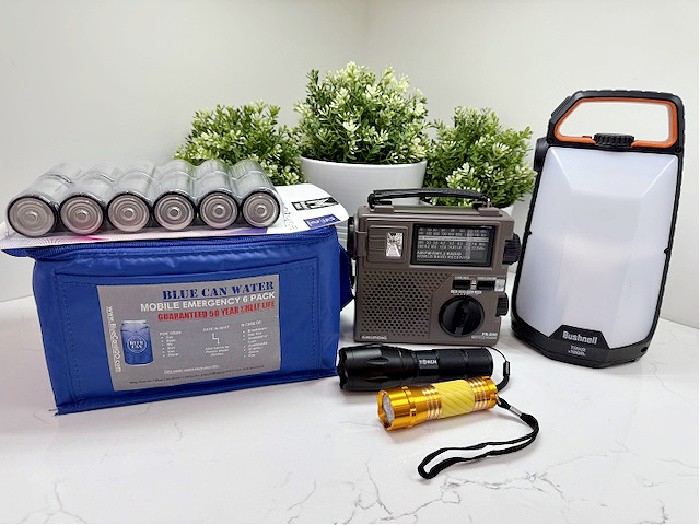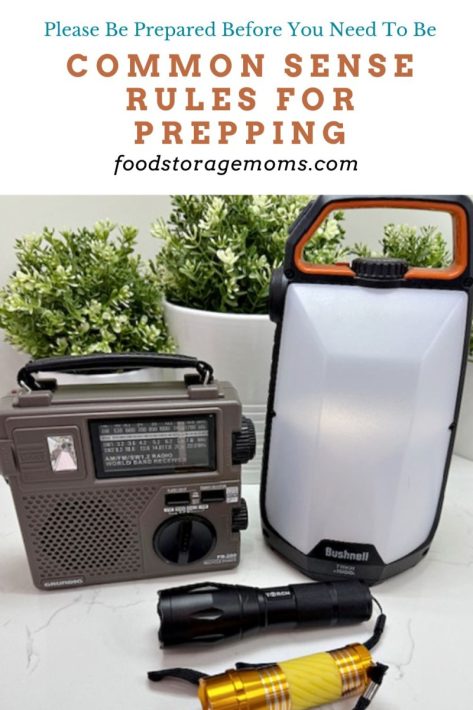
Preparing for power outages, loss of income, or natural disasters makes sense. But how you prepare should make sense, too! So, I’ve come up with a list of common-sense rules for prepping that will help you prepare for anything in a sensible way.
Common Sense Rules For Prepping
Regarding being prepared, it’s common sense that you can’t predict what will happen in every situation. You don’t know if you must prepare for a power outage, job loss, natural disaster, or a global pandemic. With these common-sense rules for prepping, you can cover all your bases without it taking over your life!

Rule #1: Don’t Get Tunnel Vision
There are too many variables to predict what will or could happen. If you get caught up in social media and what everyone else is freaking out about, you may not be prepared for something else that happens.
Many preppers prepare or invest in specific gear while ignoring other possible outcomes. What is the point in being ready for a power grid failure if you aren’t prepared to handle a simple tornado or hurricane? Don’t get tunnel vision and focus only on one catastrophic thing that could happen. Prepare for basic needs regardless of the situation.
Preparing for disasters or emergencies that happen most often in your location makes sense. Preparing for hurricanes in Florida makes total sense. Preparing for earthquakes in California also makes sense. But remember, you can have terrible storms in California and earthquakes in Florida, so prepare for those and other challenges no matter where you live.
Rule #2: Make Preps Simple, Usable, and Practical
When we are in crisis mode, our brains work differently. You may have some better senses, but you may not have the capacity for rational decisions or the ability to remember how one of your preps even works.
For example, this may be an impractical prep if you don’t have specific training on using Decompression needles and esophageal tubes. Even if the situation arises, you may cause further harm because you don’t know how to use them properly.
Your preps must be practical and usable, especially when your brain is in crisis mode. The less you have to remember, the better things will go. Having “how-to” books available can take some pressure off. It’s a problem if you put those books together based on materials or equipment you have but haven’t learned to use them. The adage, Practice Makes Perfect, applies here.
Rule #3: Don’t Try to Remember Everything You Read
We put a lot of helpful information on this blog, but it’s impossible to remember everything. When reading the information, try to take one thing away from it that you can absorb into the back of your brain.
For example, my Duct Tape post lists 15 ways to use duct tape in various situations. You can’t remember all 15 things, but could focus on one major thing. The real value of a post like this is that duct tape is something you can use for many things, and is thus essential to stock. As mentioned above, putting the information to practical use reinforces what you’ve read and studied, so practice and the process approaches will make more sense and come to mind as needed.
Rule #4: Use the 80/20 Rule
Even the best preppers can never be 100% prepared for everything. This is because we can’t predict the future. An example of the 80/20 rule is that 20% of readers post 80% of the comments, or 20% of people determine 80% of the politics.
With this, we can create a framework for prepping. If you have two weeks of supplies and a bug-out bag in your home, you are better prepared to handle any emergency than 80% of the population. You won’t ever be 100% prepared, but you can be 80% more prepared than anyone else. Don’t overstress trying to get 100% prepared.
The challenge you face is setting your priorities for preparing for those most common situations. You can research weather patterns, seismic happenings near your community, flood maps, etc. to see the most common challenges you may experience and then plan accordingly.
Rule #5: Have a Healthy Mix of Preps
When you are prepared for anything, your preps should be a mix of gear, supplies, skills, practice, planning, community, and you. Preppers can usually be divided into two groups: those who have gear but few skills and those who have skills but not the gear. You want both, and here’s why:
- You may have all the gear in the world, but it will do you no good if you don’t know how to use it.
- You could have enough food to feed an army, but if you don’t know how to cook it without a stove, you won’t be able to eat it.
- If you have the best urban garden but can’t defend yourself against those who will take your food or the pests that frequent your area, you will be in trouble.
Having gear and supplies goes hand in hand with practicing how to use them, planning when and how you will use them, and having the right skills to use your preps. Again, it doesn’t need to be 100%, but you need a healthy mix.
Gear is important! Skills are important! Planning is important! Being able to defend yourself is essential!
Rule #6: Invest in Preps with a Budget
If you are new to prepping, you should expect to dish out a pretty penny to prepare for most things. If you are prepping for yourself with a basic mix of supplies and gear, you should expect to spend $800-$1000. For a family of 4, you’re looking at about $2500. After you’ve spent the money on the basics, maintaining it will only cost about $100 per month, plus food.
That said, you don’t have to spend all that money simultaneously! You can buy the most essential things for $40, then save, buy the next thing, and repeat until you have what you need. You can get started even if you only have an extra $20. In my Prepping for Beginners: A Guide to Get You Started, you can use the first shopping list to get started today.
Rule #7: Do NOT Let Prepping Dominate Your Life
The prepping community is filled with passionate and engaged people, which is part of what helps motivate others to prepare. But sometimes, people get so passionate about being prepared that it can dominate their lives and how they spend their money, which can grow into an unhealthy fear.
Although fear can fuel transformation, it can also dominate your life to the point where you aren’t enjoying the life you have. There’s a difference between survival fear and irrational fear. It’s important to prepare for the future, but it’s also essential to keep your perspective.
Spend a reasonable amount of time, money, and energy on prepping, but don’t let it dominate your life.
Rules for Prepping Basics
Prepping doesn’t have to be complicated, time-consuming, or filled with anxiety. When it comes to prepping, there are a few more basic rules to remember:
- Get your finances in order– Pay down debt, have savings, and have cash on hand for emergencies.
- Prepare for at least two weeks of complete self-reliance. You need enough water and survival food for everyone in your house to eat for at least two weeks, and I recommend a month. In addition, have emergency fuel sources and ways of heating and cooking your food without gas or electricity.
- Prepare a bug-out bag—Although I don’t recommend leaving your home with all your preps unless you absolutely have to, you should have a bug-out bag with 72 hours of survival gear and supplies.
- Learn skills and practice—You want to know core homesteading skills and practice with your gear before something happens.
- Have a first aid kit—Make sure you have items for minor cuts, scrapes, sunburn, or medical needs, as well as over-the-counter medications for fever, cough, stomach issues, and common illnesses.
- Know how to protect yourself—Part of being prepared is knowing how to protect yourself and your home from looters and those seeking to hurt you.
Final Word
When prepping, it’s important to hope for the best and plan for the worst! Being prepared means you can still live a whole and active life, but having a backup plan is a smart move. Use these common-sense rules for prepping and focus on getting practical, proper preps.
Once you learn some reasonable basic prepping steps, don’t be bashful about sharing what you know with family, friends, and others who are willing to listen. May God bless this world. Linda
Copyright Images: Hurricane Supplies AdobeStock_458745 Lisa F. Young
The post Common Sense Rules For Prepping appeared first on Food Storage Moms.
from Food Storage Moms
No comments:
Post a Comment